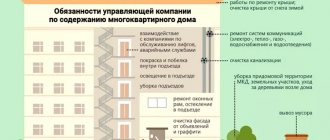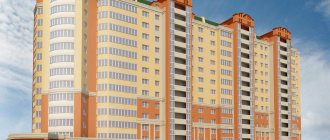The highest governing body of a housing cooperative or residential complex
Like any organization, for effective operation, coordination of resources and funds, control of the organization’s expenses, and overall smooth operation, the governing bodies of a housing cooperative are formed. The governing bodies of the housing cooperative are:
- a meeting of members of a cooperative or a general meeting, also called a conference if the number of its members exceeds fifty;
- the board of the cooperative, and the chairman of the board elected by the cooperative.
The Housing Law of the Russian Federation determines: the highest governing body in a housing cooperative is a meeting of members of the cooperative, or conference. This body is assigned a certain competence. The limits of the powers of the conference and the procedure for holding it are enshrined in the charter of the cooperative.
The frequency of convening and the conditions necessary for convening the body in question are also determined by the charter; meetings are divided into regular, at least once a year, and extraordinary, which are convened as necessary to resolve important issues regarding the subject of legal relations that form the scope of the cooperative’s activities.
Powers of the highest management body of a residential complex or housing cooperative
The scope of powers of the conference is fixed by the charter. Typically, in normal practice the authority will consider:
- issues related to the admission of those wishing to become members of the cooperative, conditions and rules for the withdrawal of a participant from the cooperative;
- the rights assigned to the participant - a member of a housing or housing construction cooperative, associated with his membership, and the responsibilities imposed on him;
- conditions for changing the status of a cooperative and the procedure for liquidation;
- procedure and deadlines for submitting activity reports;
- issues of choosing bodies representing the cooperative, regulating and monitoring its activities;
- transfer of residential premises of the house into the ownership of members of the cooperative.
Decisions made and approved at the conference, taking into account their legitimacy and compliance with the procedure for adoption determined by law, are mandatory for execution by each participant in the cooperative.
Concept of a cooperative house
To best understand what a cooperative house is, you need to understand the definition of the word “cooperative.” Cooperative houses appeared back in Soviet times and proved themselves so successful that they still remain in our present.
A cooperative is a form of association of citizens . They can unite for various reasons and for various purposes. Hence the huge number of types of cooperatives existing in the country: garage, housing, industrial, consumer and others.
A housing construction cooperative is a form of association of people for the construction of a residential building and its further management. People contribute their money in the form of shares before the house is even ready. In essence, this agreement with a housing cooperative is similar to an equity participation agreement. However, it has more risks, since it is subject to registration only after the house is put into operation.
The simplified procedure for building a cooperative house is as follows:
- citizens unite, create a cooperative and form a common share;
- the house is being built by third parties;
- members of the cooperative move into finished housing and gradually pay off the remaining shares.
This procedure corresponds only to the activities of housing cooperatives. The housing cooperative does not build houses itself; it buys housing on the real estate market. Until the share is fully paid, the apartment remains the property of the cooperative.
Whether it should be privatized after full payment of the share is a personal matter for everyone. Privatization and full registration of ownership will allow you to freely sell your home in the future without the participation of other members of the cooperative.
Difference from an ordinary house
If you answer the question of how a cooperative house differs from an ordinary one, you need to highlight the key features of such housing.
The management of the cooperative house is carried out by the housing construction cooperative. In addition to the housing cooperative, the management of the house can be carried out by the HOA or the management company.
The difference here is manifested in the fact that the housing cooperative is formed even before the appearance of the house itself. An HOA is organized only when the house already exists. The management company is generally a separate division, not connected in any way with the house, except through a property management agreement.
Ordinary houses are built by developers or the state, sometimes at the expense of shareholders, sometimes at the expense of their own or borrowed funds. Cooperative houses are built by cooperative members, but not independently, but with the help of third parties.
Otherwise, the procedure for purchasing such an apartment or selling it, managing the house and resolving the most important issues is no different from the same events in an ordinary house. For example, payment for utilities is carried out according to the same scheme.
Do I need to pay for major repairs if the house is a cooperative one? It is necessary to pay contributions regardless of the type of house and the way it is managed. Minimum tariffs are set at the regional level. The accumulated funds are formed in special bank accounts opened by the housing cooperative or the regional operator.
You can refuse to pay contributions for major repairs only if the house is recognized as unsafe.
The rights of residents of a cooperative building are prescribed in the charter of the established cooperative and in agreements concluded between the participants and the association itself.
How to register in such housing? Just like in a regular house.
Advantages and disadvantages
A cooperative house and living in it has its pros and cons. The benefits are mainly related to the economic benefits of purchasing such housing.
The advantages of buying an apartment in a cooperative building are as follows:
- Citizens over 16 years of age or legal entities can become a member of the housing cooperative.
- To create a housing cooperative, a very small number of participants is enough.
- The overpayment for housing is minimal, since it only includes the costs of maintaining the housing cooperative during the construction of the house.
- The amount of the contribution is calculated on the basis of the construction estimate.
The minimum number of participants to create a housing construction cooperative is limited to 5 persons.
Here you do not need to collect a huge number of certificates and documents, as is the case when applying for a mortgage from banks . There is no such huge overpayment for an apartment as in the case of a house being built by a developer who wants to extract maximum profit from this project for himself.
The disadvantages of building a cooperative house include:
- The agreement is not registered, hence the high risks of double sales of apartments.
- A housing and savings cooperative may require additional contributions from members, the amount of which may significantly exceed the original shares of the participants.
- All additional and targeted contributions when a citizen leaves the cooperative are not returned to the housing cooperative.
Owners of future apartments will have to independently organize the construction process, purchase materials and monitor the work of builders. In a housing cooperative, it will be possible to move into a house only after repaying half of the full amount, and registering ownership only after the full repayment of the share. In total, housing cooperative participants have lower costs than housing cooperative participants.
It is better to choose a DDU for purchasing real estate that has not yet been built. Firstly, DDU is subject to mandatory state registration with Rosreestr to protect against the risk of double sales. Secondly, in 2021, escrow accounts are in effect in the country, protecting shareholders’ funds from unscrupulous developers until the completion of the house’s construction.
Exclusive competence of the conference
The charter of the cooperative may include the solution of various problems within its competence, however, a number of issues fall within the unconditional competence of the highest management body. These include:
- the procedure for making additions and changes to the documentation regulating the activities of the cooperative regarding a residential building, making amendments to it;
- determination of members of the liquidation commission, resolution of issues related to liquidation balance sheets;
- appointment of persons constituting the board of housing complexes or housing cooperatives, the limits of their powers, the procedure for performing duties and terminating powers;
- determination of the composition of the commission dealing with audit issues;
- resolving issues regarding any form of alienation of property owned by the cooperative;
- resolving issues related to carrying out repair work in the house, reconstruction of the house, erection of superstructures, construction of utility blocks, and other work on the property of the house;
- issues related to the debt obligations of the cooperative;
- determining the frequency, method of payment, amounts of payments and contributions obligatory for members of the cooperative;
- determination of easements in the house;
- consideration of citizens' statements regarding the actions of the board of the cooperative, including complaints against the actions of the chairman of the board;
- resolving the issue of the limits and procedure for remuneration of current members of the board and the auditor;
- other issues and tasks enshrined in the charter as the exclusive competence of the general meeting.
Conditions for demolition of cooperative housing stock
At the end of today’s article, let’s pay attention to the possibility of demolishing the cooperative building. The conditions for such a measure are reflected in Articles 32, 86 and 134 of the Housing Code of the Russian Federation. If you wish, you can familiarize yourself with them without much difficulty. The interpretation and reflection of all legislative concepts are made accessible to Russian citizens.
When demolishing a cooperative building, several outcomes are possible:
- Residents will be provided with adequate state apartments with the possibility of subsequent privatization.
- Cooperative members will be paid compensation.
Note! If the shares are not fully repaid, the citizen receiving housing or compensation will be obliged to fully fulfill his obligations to the cooperative in the previously agreed upon manner.
Perhaps this is where the most important points on the topic of today’s article end. We hope that the presented material was useful to all readers and provided answers to their questions.
As you can see, there are no particular difficulties either in the phenomenon under consideration or in the rights of residents of a cooperative building. Everything is extremely simple and transparent to understand.
Cooperative home - pros and cons, what problems there are in the video:
See also Phone numbers for consultation March 28, 2021 kasjanenko 1255
Share this post
Discussion: there is 1 comment
- Ivan says:
10.26.2019 at 14:05I am now buying an apartment in a building that was previously considered a cooperative building. But the current owners have all the documents for ownership of this property. Could some unpleasant nuances arise later?
Answer
Alternative competence of the highest management body
The alternative competence of the conference may include discussion and decision-making on issues that are authorized to consider the control bodies of housing complexes and housing cooperatives and the executive and administrative bodies of these organizations. Despite the fact that the highest governing body can consider any issues related to the activities of the cooperative, it cannot prevent citizens from defending their interests and exercising their legal rights regarding the provision of premises in a residential building and the use of it; compliance with these rights is, of course, the primary task of the cooperative .
FORMS OF HOUSING MANAGEMENT
Currently, housing construction is carried out in two main ways: through housing-construction consumer cooperatives and the equity method, in which both individuals and legal entities participate.
Housing and construction consumer cooperatives, as a rule, are formed from those citizens who are registered on the lists of those in need of improved living conditions on the initiative of local executive bodies, administrative organizations before the start of construction of new houses, reconstruction of existing ones, or acquisition of residential buildings. At the same time, housing construction cooperatives are created for the purpose of constructing apartment buildings and their subsequent use and management. A housing cooperative can also be created for the purpose of acquiring not only new, but also capitally repaired, completely reconstructed residential buildings, their operation and management.
From the moment the ownership of residential and (or) non-residential premises in a building is established, two or more owners have joint homeownership.
In accordance with the current legislation, relations on joint home ownership in non-residential premises are regulated by the Law of the Republic of Belarus “On Joint Household Ownership”; property relations of joint home ownership in the housing stock are regulated, in particular, by the Housing Code of the Republic of Belarus.
The main characteristic of joint homeownership is the presence of common shared ownership, that is, each owner of the property (apartment, residential and non-residential premises), along with the premises belonging to him, also owns a corresponding share in the common elements of the building that are in joint use of the owners.
Thus, when putting a residential building into operation, the participants in the home ownership are obliged to make a choice at a general meeting about the method of regulating the management of common property. This decision must be made within 6 months from the date of commencement of joint home ownership.
The effective functioning of joint home ownership depends on the effectiveness of management and ownership of the common property of joint home ownership.
Today, the legislation has established an exhaustive list of methods for managing and owning common property of residential joint households:
- personally by participants in joint home ownership (this method of management can be chosen only if the residential building contains no more than five premises belonging to different owners. In this case, all participants in common home ownership enter into an agreement on joint home ownership, the standard form of which is approved by the resolution Council of Ministers);
- a partnership of owners or an organization of developers (ZhSPK);
- an authorized person for the management of common property (apartment building), appointed by the local executive and administrative body in accordance with the law (Housing and Repair Operational Association - hereinafter ZhREO).
Members of the HOA (developer organization) have the right at any time to change the method of organizing the management of their common property by adopting a decision at a general meeting on a different method of managing this property of joint homeownership. The procedure for holding a general meeting on this issue is similar to the procedure for holding a general meeting of participants in a single household to choose the procedure for managing their common real estate.
If the owners have not chosen a management method within the period established by law, the local executive and administrative body appoints a responsible (authorized) person for organizing the management of common real estate without holding an open tender from among government organizations operating the housing stock and (or) providing housing -public utilities.
An authorized person can also be appointed if, in common household ownership, the preservation and operation of property is not carried out, the proper work of the governing bodies is not organized, as well as in cases where the term of office of the appointed governing bodies has expired, and efforts to elect them are absent or do not produce positive results.
The rights and obligations of the authorized person are determined by the relevant Regulations approved by the Resolution of the Council of Ministers of the Republic of Belarus. The main tasks of the authorized person are the management of common real estate, the organization of maintenance and repair of a residential building, as well as the creation of conditions for providing participants in joint home ownership with housing and communal services.
The procedure for holding a general meeting of owners on the issue of choosing a method of managing the common property of a joint household
The initiator of the organization of a general meeting of the villages of a joint household to choose a method for managing their common property can be initiated either directly by the participants of the joint household, or by a local executive and administrative body.
At the stage of construction of a residential building, the developer has the right, before putting the property into operation, to initiate the creation and organization of a partnership of owners from among the existing shareholders participating in the construction of the residential building, who will have ownership rights to the property.
For the legal holding of the meeting, the initiator, no later than 20 days before the date of the meeting, sends each participant in the joint household a written notice of the upcoming general meeting (either by registered mail or handing it over against signature).
If any of the members of the joint household is unable to personally attend or take part in the general meeting, he has the right to vote earlier than the date of the appointed meeting. In this case, he sends a written statement to the initiator of the meeting, in which he expresses his opinion on the issue of choosing a method for managing the common property.
A general meeting on the issue of choosing a method of managing an apartment building is legal only if it is attended by more than 2/3 of the participants in the joint household (or their representatives) who have more than 2/3 of the votes of the total number of votes of all owners.
In the absence of a unanimous decision, a second general meeting of members of the joint ownership of the property is held. A repeated meeting can be considered legitimate if it was attended by more than two participants in the joint ownership of real estate, holding at least one quarter of the votes of the total number of votes of all owners (that is, at least 25% of the total number of participants in the joint homeownership).
The resolution of the issue of the general meeting on choosing the procedure for managing common property must be adopted in the prescribed manner and will be binding on all owners of the apartment building, including those who did not participate in the vote or voted against it.
This decision can also be made by conducting a written survey. The organization of a written survey is organized by filling out a questionnaire on all the issues specified in it by a participant in a joint household.
This type of voting is also legal, but only if it was attended by participants in the joint ownership of real estate who have more than 2/3 of the votes of the total number of votes of all members of the joint homeownership.
A partnership of owners (organization of developers) is considered created and vested with the rights of a legal entity after the moment of their state registration.
The created HOAs and developer organizations will be legal entities whose activities are aimed directly at the maintenance and management of joint home ownership. Choosing a method of managing common property through a partnership of owners or an organization of developers will allow owners, in order to improve the quality of housing and housing and communal services, to make decisions at a general meeting on the use of common property, receiving various types of services that go beyond standard maintenance (not included in housing -public utilities).
General meeting of members of the association of owners (organization of developers)
In contrast to deciding on the form of management, in order to make decisions that fall within the sphere of influence of the general meeting, members of the owners’ association (developer organization) who have at least half of the votes of their total number must be present at the general meeting.
If the HOA (developer organization) has more than 50 members, the general meeting has the right to elect a composition of commissioners. The general meeting for the election of commissioners will be valid if more than 2/3 of the participants in the homeowners association (developer organization) are present. Commissioners are elected from among the members of the HOA (developer organization) based on the fact that for every five members of the owners' association there must be at least one commissioner. The charter of the HOA (developer organization) may provide for other representation.
The procedure for holding a meeting of authorized representatives is similar to the procedure for organizing a general meeting of HOA participants (organizations of developers). The meeting of authorized homeowners has the right to consider issues that fall under the exclusive responsibility of the general meeting of members of the HOA (developer organization). At the same time, the meeting of authorized owners does not have the right to make decisions on the following issues:
- making changes and (or) additions to the charter of the partnership;
- establishing the size and timing of contributions (payment of HOA);
- establishing a procedure for the distribution of residential (non-residential) premises between members of the developers’ organization;
- election of commissioners, early termination of their powers;
- making a decision on the choice of method of managing common property;
- making decisions on reorganization and liquidation.
At the general meeting of the association of owners, each participant (developer organization) has a number of votes that is proportional to the volume of his share in the ownership of common real estate (if any of the participants in the developer organization is not listed directly as the owner of real estate, he has the right to one vote independently on the size of the occupied real estate). At the meeting of authorized representatives, each authorized member of the partnership has a number of votes that is equal to the sum of his own votes and the votes of the members of the HOA (developer organization) represented by him. In this case, the smallest share in the total property is always taken as one vote.
The general meeting of HOA participants is organized by the board of the owners' association as necessary and when issues arise concerning their sphere of influence. However, meetings must be held at least once a year. Extraordinary meetings of HOA participants can be held by decision of the board, at the proposal of a local executive body or administrative organization, at the written request of the auditor (HOA Audit Commission) or HOA participants (developer organizations) with at least 25 percent of the votes of their total number.
Such a written demand (proposal) with the proposed agenda is sent to the board of the owners’ association (developers’ organization), which is obliged to make a decision within 7 days and schedule the convening of an extraordinary meeting of the HOA members. In case of refusal of the board, the initiators have the right to independently organize an extraordinary meeting of members of the CU (organization of developers).
If necessary, resolution of issues of the general meeting of participants of the homeowners association (developer organization) can be carried out by organizing a written vote or a survey.
Decisions made in the prescribed manner are binding on all members of the partnership.
In order to improve the quality of service for a residential building, members of the owners' association (developer organization) can take various types of issues relating to maintenance, the provision of additional housing and communal services, and so on at the general meeting.
The Housing Code of the Republic of Belarus establishes the obligation of the association of owners of an apartment building (organization of developers) to ensure the organization of maintenance of objects, real estate belonging to them and the adjacent (surrounding) territory, including the safety and operation of the apartment building.
The maintenance, maintenance and ongoing repairs of common property in an apartment building, as well as the maintenance of the local area and other services whether or not included in the list of housing and communal services, the association of owners (organization of developers) can, by decision of the general meeting, be carried out independently by the full-time employees of the partnership, housing cooperative (janitor, plumber, electrician, etc.). A homeowners association (an organization of developers) can also provide paid services to owners of residential premises for the maintenance and repair of premises, indoor plumbing and other equipment.
To solve problems directly related to the provision of housing and communal services, the owners of an apartment building at a general meeting can also decide to attract, on contractual terms, organizations that operate the housing stock and (or) provide housing and communal services.
When making payments for basic housing and communal services, homeowners' associations and developer organizations are required to apply tariffs for the population established in accordance with the law.
In cases where the actual cost of housing and utility services (including maintenance, use of an elevator) is higher than the income received from the population at subsidized rates, the owner’s association (organization of developers) has the right to apply to the local executive and administrative body for reimbursement of part of the costs from the budget or make a decision at the general meeting of participants in the association of owners (organization of developers) to compensate for losses through additional contributions from members of these organizations
The size, composition and procedure for making additional contributions are determined by the charter of the owners' association. For late or incomplete payment of contributions, members of the association of owners (organizations of developers) pay a fine in the amount that was established by the general meeting or a meeting of authorized members of the HOA in accordance with the law.
At the same time, in accordance with the Housing Code, entrance, membership, target and additional fees must be paid by transferring money (cash, checks, etc.) to an authorized representative of the HOA board or, at the request of a member of the owners’ association, by transferring funds to the settlement (current) bank account of this organization.
Provision of basic and additional housing and communal services
Payment for housing and communal services provided to the population includes payments for basic (maintenance, routine repairs, major repairs, utilities) and additional housing and communal services. In addition, refusal to conclude an agreement for the provision of basic housing and communal services does not exempt them from paying fees for the actual basic housing and communal services provided. Payment for basic and additional services is determined according to tariffs for housing and communal services.
Payment for additional utility services includes payment for housing and communal services provided in addition to basic utility services in accordance with contracts for the provision of additional housing and communal services.
In the event that participants in a joint homeownership use additional housing and communal services, a decision must be made at a general meeting of members of the partnership to establish a procedure for these services. In addition, each of the participants in joint home ownership has the full right to refuse the additional utilities provided to him and not to use them, and, accordingly, not to pay.
Additional services can be provided to the consumer of housing and communal services and paid for by them only after concluding contracts for the provision of these types of services. Forcing the provision of additional housing and communal services, as well as making additional contributions to the notice of the amount of payment for housing and communal services will be considered a violation of this legislation.
Control and audit bodies. Activity control
In order to exercise control over the financial and economic activities of the partnership of owners (organization of developers), the general meeting elects an auditor or audit commission of the HOA from among the members of this partnership (organization of developers).
The audit commission or an individual auditor undertakes to report only to the general meeting.
Without the conclusion and (or) report of the audit commission of the association of owners (organization of developers) or an authorized auditor, the meeting (meeting of authorized) members of the HOA (organization of developers) has no right to approve either the annual report or the annual balance sheet of the association of owners.
If gross violations or shortcomings are identified in the financial and economic activities of the HOA and (or) financial violations from the position of the board and (or) the chairman of this board of the partnership, the audit commission (auditor) of the partnership, within 10 days from the moment when these violations were discovered, undertakes to request organizing an extraordinary general meeting of HOA members.
Temporary commission of the highest management body of housing cooperatives or residential complexes
In a situation where it is necessary to resolve a specific issue, the board of the cooperative or its supreme body may convene a temporary commission. The limits of the powers of such a commission are determined by a special document - a power of attorney, which is drawn up in full compliance with the requirements imposed by law for such documents. A power of attorney is issued to the head of education as an authorized person. When the issue for which the commission met is resolved, the body provides a report on the work done and its results, after which it is subject to dissolution.




